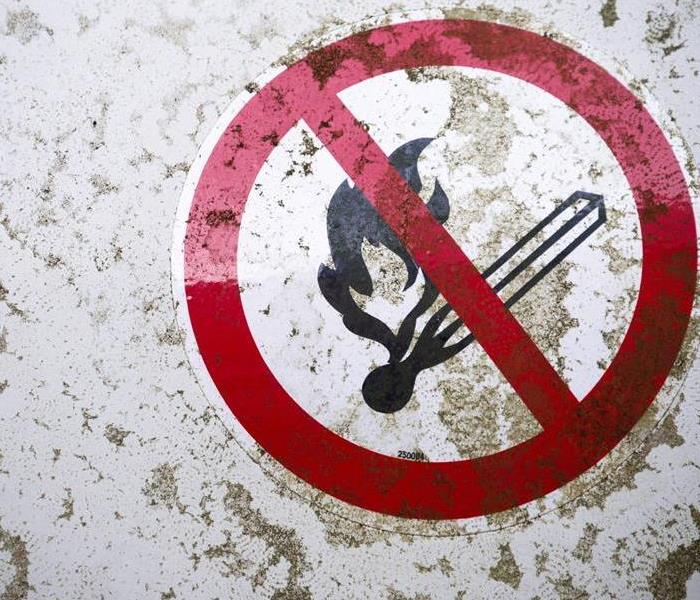Archived Fire Damage Blog Posts
What Is Soot?
8/10/2023 (Permalink)
Soot damage is quite common after a fire. Soot is a black powdery or flaky substance that forms through incomplete combustion. Fine soot particles can cling to surfaces such as walls and ceilings, as well as building contents. Soot can be difficult, sometimes impossible to remove.
There are usually two types of soot: dry and oily. A quick test to determine which type of soot you’re faced with is to simply run your finger across a soot-covered surface. If it smears, the soot is oily.
Sometimes soot will be dry in one room, but oily in another. It all depends on the types of materials that burned.
Tips For Helping To Prevent Fires
7/17/2023 (Permalink)
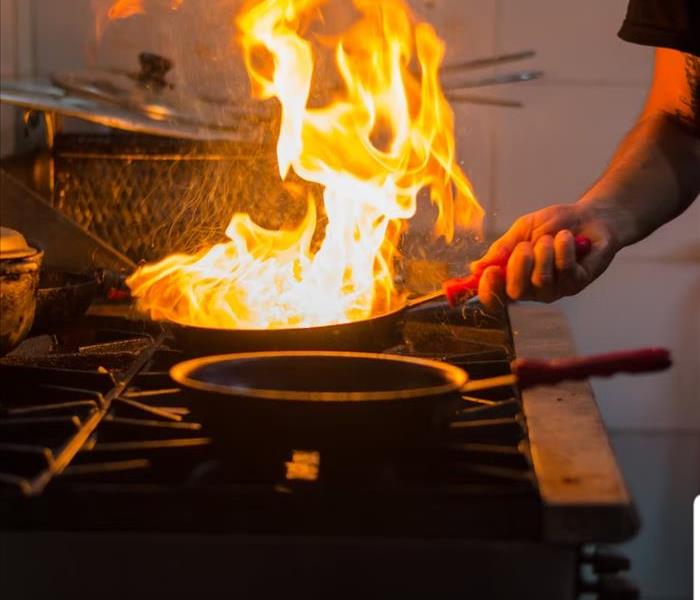 Preventing Fires
Preventing Fires
- Did you know that cooking is the leading cause of house fires? Cooking starts almost half of all home fires. Make sure to have a fire extinguisher close by when cooking and Never leave anything cooking unattended.
- Heating is the second highest cause of fires. Always give space heaters plenty of space from anything around them. Try to avoid using extension cords but if you must use them make sure they are in good shape and don't overload them.
- Check your smoke detectors monthly to make sure they are properly working and have a plan in place for your home or business in case of a fire. It could save lives.
- If you ever have fire, smoke, or soot damage give us a call. SERVPRO will make it like it never even happened.
SERVPRO of Roanoke Rapids Are Experts in Fire And Soot Cleanup
8/23/2022 (Permalink)
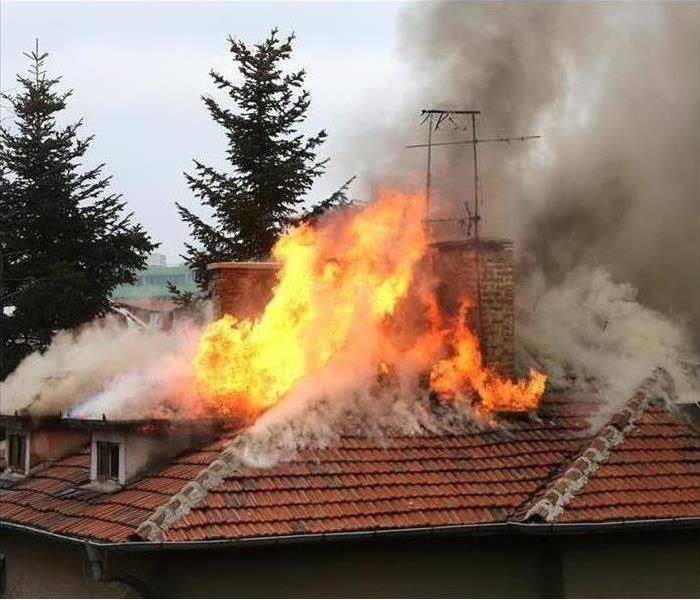 House fires can be incredibly stressful. Let the restoration experts at SERVPRO of Roanoke Rapids help lessen the load.
House fires can be incredibly stressful. Let the restoration experts at SERVPRO of Roanoke Rapids help lessen the load.
After a house fire, owners commonly find soot on walls, ceilings, and on other materials or objects. Most wall surfaces are porous, including brick, painted walls, and wallpaper. Soot consists of very fine particles that can deeply penetrate into porous surfaces. Soot can causing hard to remove stains and lingering odors throughout your home.
While it's often possible to remove soot from walls and ceilings, in some cases it may be necessary to remove and reinstall affected materials like drywall and wallpaper. Professional restoration firms can often determine the best path forward to get an optimal outcome from soot clean up after fire damage.
SERVPRO of Roanoke Rapids' fire restoration experts are trained and equipped to handle smoke, ash, and soot cleanup. Our process allows us to quickly and effectively get your home back in order. To learn more or for assistance in removing smoke/soot from your fire damaged home, check out the other blogs on our website, or feel free to give us a call at 252-537-3473. We can handle jobs of any size, for your home or business.
How Fast Fire Can Spread Through Your Home
8/4/2022 (Permalink)
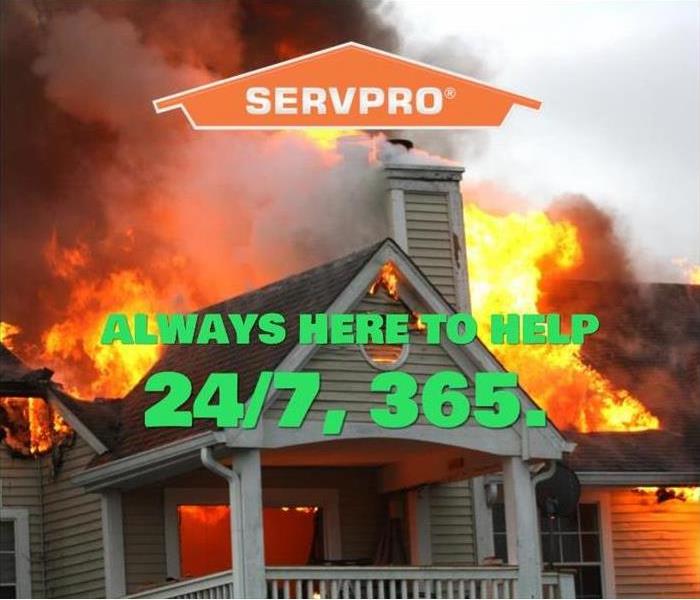 Having a plan of action in case of an emergency can help keep you and your family safe.
Having a plan of action in case of an emergency can help keep you and your family safe.
We have all driven past a burnt-down building and thought to ourselves “I hope that never happens to me.” Sadly, substantial Fire Damage can happen in just a few minutes. In a video titled “How Fast Does a Fire Spread”, the Department of Commerce demonstrates just how quickly a fire can spread by igniting a dried-out pine tree.
In this case, within 20 seconds, the sofa immediately next to the tree is set on fire. Within 35 seconds, the room becomes so full of smoke that it becomes almost impossible to see the damage being caused. When seeing the damage from this perspective, it’s not farfetched to imagine an entire home being destroyed within minutes. As a result, here are a few helpful hints to consider for keeping your home and family safe to prevent the need for fire damage restoration.
- Install smoke alarms on every level of your home, prioritizing bedrooms and other sleeping areas.
- Test your smoke alarms on a monthly basis.
- Establish a fire escape plan and rehearse it with your family. Be prepared to evacuate in the event of an emergency.
Our crews work hard to perform fire restoration services after a building fire, just as the Roanoke Rapids Fire Department works hard to keep our community safe 24/7, 365.
5 Cooking Tips To Reduce Fire Risk
3/14/2022 (Permalink)
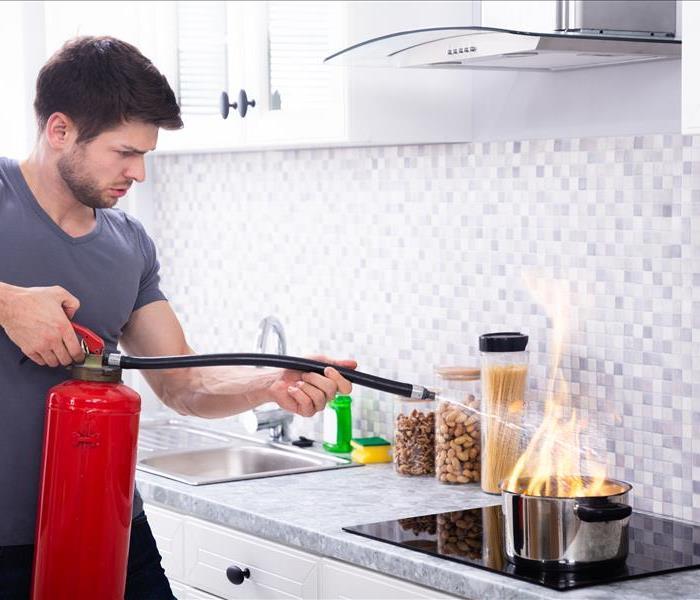 Reduce Fire Risk by Following These Tips.
Reduce Fire Risk by Following These Tips.
Nearly everyone spends at least some time cooking a meal on a daily basis. Cooking is a routine task that is often done in a hurry to get family members fed before they rush off to work, school, or other activities.
Cooking fires are the number one cause of home fires and fire-related injuries in the United States. Your home in Roanoke Rapids, NC may be at risk, too, if you don't take the proper steps to prevent fires. Here are five cooking tips to reduce fire risk in your home.
Important Tips to Avoid Cooking Fire Risk
1. Establish a Kid-Free Cooking Zone
When the kids are hungry, they tend to get underfoot. Not only is it annoying to try and cook while they're in the kitchen with you complaining of hunger, but it's dangerous. Very small children can trip you up and cause things to get knocked off the counter or stove. Being distracted might prevent you from noticing that something is starting to burn, or you might forget that the oven is on at all. Establish a kid-free cooking zone to keep everyone safe.
2. Stay in the Kitchen - Always
Cooking accidents that result in fire damage most often occur when something is left unattended on the stove or in the oven. Even if you think that you'll only be gone for a minute to change a diaper or let the dog outside, there's always a chance that something can catch fire in that short time. If it does happen, use a fire extinguisher if you can do so safely, but first get everyone out of the house. Later, a fire damage assessment can be made to determine your restoration needs.
3. Clean Regularly to Prevent Grease Buildup
One way to prevent a grease fire is to clean your stovetop regularly. While it might feel like one more thing to do, quickly wiping down the stove after each meal prevents a big cleaning project later and helps to keep your family safe from fires.
4. Keep Flammable Objects Away from Heat Sources
When you're rushing to get dinner on the table, you might not be cleaning as you go. Rather, you use all the available counter space for prep and worry about cleanup later. One of the most important fire prevention tips is keep flammable objects away from heat sources. You might toss a kitchen towel on top of the toaster oven but if you forget that it's there, someone might turn on the toaster oven without moving the towel which can then catch fire.
Cardboard packaging, paper plates, wooden utensils, and hot pads are just some of the flammable objects that are likely found in your kitchen during meal prep. Be intentional to put those items where they belong to prevent accidents.
5. Check the Stove Before Bed
As a part of your nighttime routine, get into the habit of checking that the stove and oven are turned off. You lock the doors to prevent intruders, so check the kitchen to prevent fires catching while you sleep.
These cooking tips will help keep your family safe during the hustle and bustle of mealtime.
How To Put Out a Grease Fire?
2/24/2022 (Permalink)
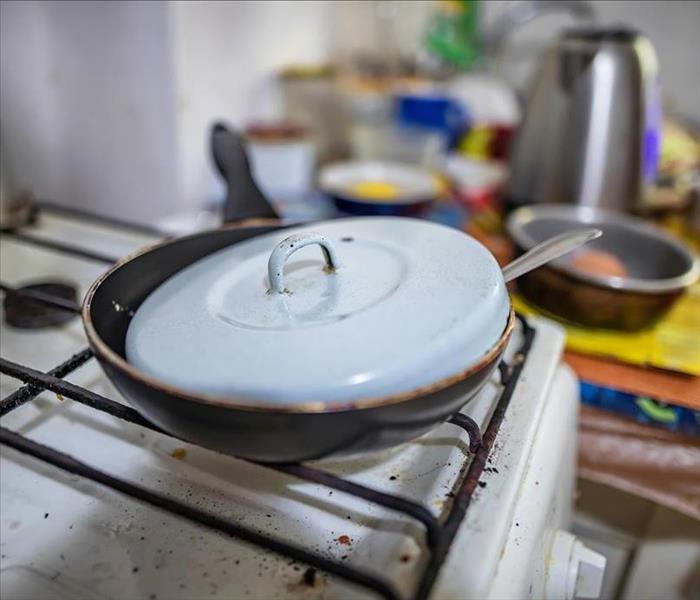 Learn More about How To Put Out a Grease Fire and avoid Fire Damage in your Roanoke Rapids, NC Home.
Learn More about How To Put Out a Grease Fire and avoid Fire Damage in your Roanoke Rapids, NC Home.
Your first reaction when you encounter a fire in your home may be to put it out with water. This technique can have disastrous results with a grease fire. Before a problem occurs, learn how to properly extinguish this type of fire.
How To Safely Extinguish a Grease Fire
Cooking is the number one cause of house fires and about half of cooking fires involve grease. Knowing how to properly put out one of these fires can prevent extensive damage to your home and reduce the amount of fire cleanup required.
1. Do Not Use Water
Never try to use water on an oil fire. This can cause the burning oil to splash out of the pan and spread flames to other areas of your kitchen. It could also land on anyone who is standing nearby and cause burns.
2. Call 911
If you are dealing with a large fire or are not sure you can put it out quickly, immediately call 911. These fires can spread quickly, so it is best not to wait until the fire is out of control to call. The 911 operator will give you advice on putting the fire out if it is safe. Otherwise, evacuate your home and wait for the fire department.
3. Shut the Stove Off
If the fire is small, first remove the heat by turning off the stove. If the fire is in the oven, leave the oven door closed. This may extinguish the fire when there is no longer enough oxygen to fuel it.
4. Cover the Fire
Use a baking sheet or lid made from metal to cover the fire. Use tongs to hold the lid so that you don't burn yourself. Do not use a fabric oven mitt. The mitt could catch on fire. Do not use ceramic or glass lids. The lids may shatter.
5. Put Out the Flames
If you can't find a lid, you can use baking soda or salt to put out the flames. However, it may take a lot of it to completely put out the fire. It may be worth purchasing a sheet pan to keep near your stove for future use.
6. Use a Fire Extinguisher
If you are unable to put out the fire using a lid, baking soda or salt, use a Class K fire extinguisher. This model is designed for cooking fires and sprays a soapy foam that smothers the flames. A Class B extinguisher can also be used, but avoid using a Class A, because it is water-based.
7. Clean Up
Even small fires can coat your kitchen in smoke, soot and ash. If you have trouble removing the stains and smells, consider contacting a fire restoration company in Roanoke Rapids, NC, to clean your home. You can usually put a small grease fire out by smothering it with a metal lid, sheet pan, baking soda or salt.
However, if you are dealing with a large fire, you may need to call 911 and evacuate your home. Err on the side of safety and remember to never throw water on a cooking fire.
7 Cooking Tips To Prevent a Kitchen Fire
1/6/2022 (Permalink)
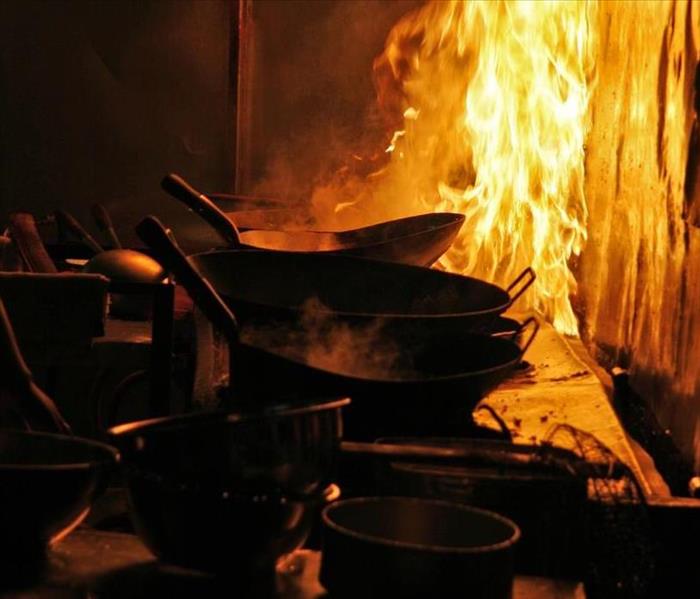 Remember these important tips to avoid Kitchen Fire in your Roanoke Rapids, NC home.
Remember these important tips to avoid Kitchen Fire in your Roanoke Rapids, NC home.
People often take for granted how hazardous cooking in their kitchen can be. After all, it's a daily process for many and easy to become accustomed to simply "going through the motions." There is a real risk of sustaining fire damage from an appliance malfunction or grease fire. Before returning to your Roanoke Rapids, NC kitchen, review these kitchen safety tips to prevent an avoidable disaster.
Do not forget these important tips to prevent a Kitchen Fire
1. Make Sure You Have Properly Placed, Working Smoke Detectors
Make sure you have working smoke detectors that are appropriately placed near the kitchen. They shouldn't be placed in the kitchen because steam and smoke from everyday cooking can prompt false alarms. The proper placement is at least 10 feet away.
2. Keep Oil and Grease to a Minimum
Use only the minimum amount of oil and grease you'll need to cook your food. Overfilling pots or pans can cause scalding hot oil or grease to splatter, which puts you at risk for burns and can easily start a fast-moving fire that will definitely require the services of fire damage restoration professionals.
3. Clean Spills Immediately
Spilling things is expected when you're cooking. Although you may be busy cooking, you should clean up spills immediately if they are near heat. This is one of the most important tips to remember. A grease buildup on your stove, in your oven or in your toaster oven can create a quickly growing fire that's challenging to extinguish. Ensure that all the kitchen surfaces are clean before you begin cooking, also.
4. Keep Flammable Materials Away from Cooking Area
It's easy to get involved in preparing your meal and overlook flammable materials coming too close to hot appliances. Be aware of your clothes (e.g., long sleeves), pot holders, dish towels, etc. Also, be careful of combustible objects such as lighters and aerosol cans sitting too close to the heat.
5. Keep Appliances Maintained
Regularly clean and maintain all of your kitchen appliances. Many of these units pose a fire risk if they don't function properly, and if they aren't maintained, they won't work as they should. It will also shorten their lifespan. Toaster ovens are common origins of fire, partially due to crumbs left in the crumb tray. Also, if you begin experiencing any issues with your appliances, even a strange sound, replace them or hire a professional to repair them.
6. Unplug Appliances When They're Not in Use
Every time you finish using them, you should unplug each smaller electronic appliance, such as toaster ovens and coffee makers. Merely being plugged in causes them to continually draw electricity, even when powered off. This can contribute to fire when they're not in use if an electrical component is faulty.
7. Never Leave Cooking Food Unattended
Never leave cooking food or appliances that are powered on unattended. Even if you have everything under control in the kitchen, things can get out of hand fast. If you must leave the area, recruit someone else to stay there until you return.
Avoid kitchen fire damage by always being mindful of these safety tips. Your family's security depends on it, not to mention your home's wellbeing.
The Necessity of Smoke Cleaning
10/21/2021 (Permalink)
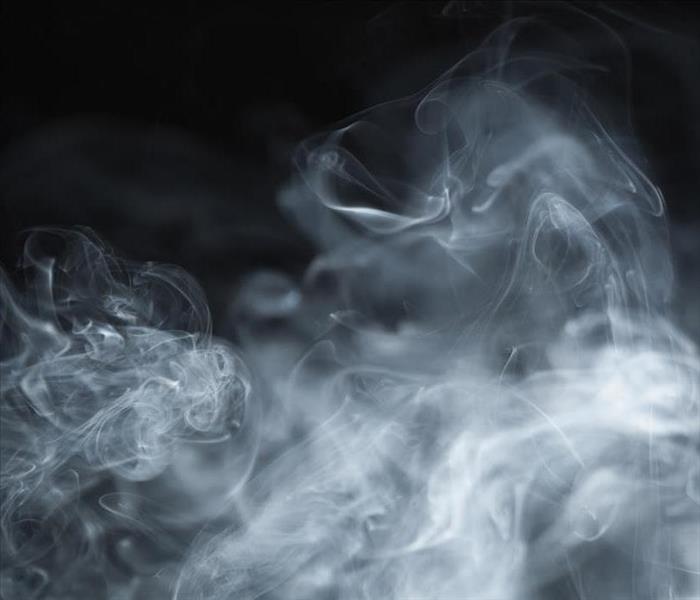 Smoke residue is damaging to your health. Clean properly your Roanoke Rapids, NC, home to get rid of it.
Smoke residue is damaging to your health. Clean properly your Roanoke Rapids, NC, home to get rid of it.
After a fire, there is a combination of damages, from fire to water to smoke. Smoke cleaning is one of the most challenging types of damage to remove from a property because it is so invasive. Smoke gets into electronics, snakes through HVAC systems, and seeps into porous fabrics and materials. If you want the best chance of recovering smoke-affected items, contact a fire remediation professional in Roanoke Rapids, NC.
The 4 Step Smoke Cleaning Process
One of the biggest complaints about fire damage is smoke odor. The odor permeates everything. It is incredibly challenging to remove and will likely require a tremendous amount of patience. Any professional service will follow a four-step approach to remove the odor of smoke residue.
1. Surface Debris Removal
The first stage of smoke damage cleanup is the surface cleaning of items in your home. There will probably be a thick coating of ash, sediment, and residue on almost every surface in the affected area. The remediation team will comb through the space using vacuums and other tools to pre-clean the space, allowing further steps to be more effective.
2. Sanitization
Smoke residue is toxic; it is not something you want to get on your hands and face or into your mouth and lungs. Whenever entering your property after the fire but before cleaning, you should wear appropriate protective gear, like gloves and a mask.
The remediation company will go through after the initial cleaning and sanitize the space using different cleaners and purification techniques. You will need to call in other professional services to clean and repair appliances or HVAC systems in some circumstances.
3. Washing and Scrubbing
The remediation service will go through at least two or three cleaning and scrubbing cycles to remove any remaining residue and odor. In some instances, you might not have a choice but to get rid of furniture and other porous items. Smoke odor tends to seep deep into fabrics, and sometimes deep cleaning is not enough to remove or eliminate persistent odors.
If you wish, you can contact specialty cleaners for items that hold particular sentimental value. These cleaners often have techniques and tools that are beyond the scope of a traditional remediation service.
4. Restoration and Deodorization
The service you hire will ensure that everything they can clean has been cleaned and scrubbed thoroughly before moving on to restoration stages. The final stages of cleaning will involve deodorization, which can utilize air purifiers.
The restoration of your property will include the replacement of damaged walls, ceilings, floors, etc. When the restoration company is done with your property, it should look like pre-disaster conditions, meaning your family can return to a place that looks and feels like home.
Smoke cleaning is a bit of a tedious process. However, when performed effectively, the process should eliminate the remaining odors and damage. The extent of the cleaning will depend on the severity of the fire, and the scope of the damage often dictates the efficacy of the restoration process. Unfortunately, after a fire, the only way to determine salvageability is to have your property assessed.
Removing Cigarette Smoke Odor From Your Home
8/26/2021 (Permalink)
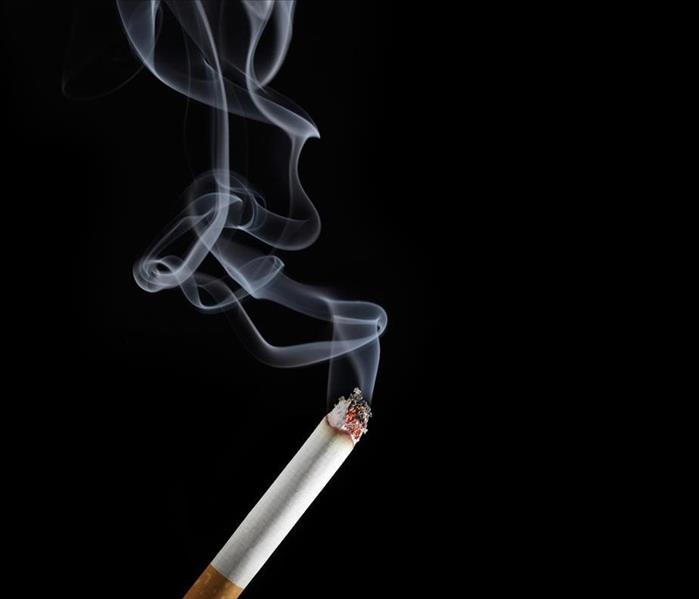 The odor of cigarette smoke is hard to remove from your Roanoke Rapids, NC, home.
The odor of cigarette smoke is hard to remove from your Roanoke Rapids, NC, home.
Removing the odor of cigarette smoke in your house is not the easiest task. The smell has a way of seeping into nonporous items and leaving a residue on harder surfaces. Despite the difficulty, home deodorization is crucial to ensuring your family is breathing in the cleanest air possible. If you call on smoke odor removal companies in Roanoke Rapids, NC, each will probably tell you some version of the same removal process:
- Discard
- Scrub
- Wash
- Purify
- Professional Help
Throw Out As Much As Possible
Discarding personal items is never easy, and if any items have sentimental value, do not throw them away. However, keep in mind that removing smoke smells from porous items is challenging. In some cases, you might need to hire a specialized cleaner, which can become expensive if you try to salvage every item in your house.
That being said, there is no harm in trying to salvage as much as possible. You can use the tools at your disposal, like your washing machine or fabric fresheners. Sometimes, it helps to place items outside for a bit, allowing them to air out.
Use Some Elbow Grease on Hard Surfaces
Before you start cleaning, it is vital to ensure there is plenty of ventilation throughout the house. Open all windows and doors and turn on all ceiling fans.
You will need to prepare a couple of different solutions before cleaning hard surfaces in the home. The first, a 50/50 solution of hot water and white vinegar; this solution is suitable for most hard surfaces. When you are ready to clean the ceiling and walls, mix a solution of 1/2 cup ammonia, 1/2 cup baking soda, 1/4 cup vinegar, and one gallon of hot water.
You will need to clean every surface when your focus is home deodorization. Do not leave anything untouched. Clean the light switches, doors, knobs, fan blades, lightbulbs, knickknacks, picture frames, etc.
Wash All Fabrics
Take anything you can put in the washing machine and do so. You will want to use 1/2 cup vinegar in the initial cycle instead of laundry detergent. After the first wash, you can use your favorite detergent and put the laundry through another process.
Anything that cannot go in the washer sprinkle with baking soda and leave it for a few days. Vacuum the excess only after it has had time to absorb the odor. You’ll want to steam clean carpeting, drapes, and upholstered furniture.
Use Natural Ventilation and Air Purification
Having all the windows open and fans going will help circulate the air in the house, but it is not enough to remove or eliminate standing odors. Whenever possible, use air purifiers, HEPA filters, activated charcoal, or white vinegar to help absorb the odor. Do not forget to change your HVAC filters at least once every three months.
If natural ventilation and air purifiers are not working, consider using an ozone generator. These devices oxidize smoke molecules, effectively eliminating the smell when appropriately used.
Hire a Professional
Odor removal is a time-consuming task. Most homeowners do not have the time to tackle the process alone. A professional remediation service can help.
Home deodorization requires time, patience, and a variety of cleaning techniques. Sometimes, the DIY approach is not worth the effort.
How To Handle a Grease Fire
8/2/2021 (Permalink)
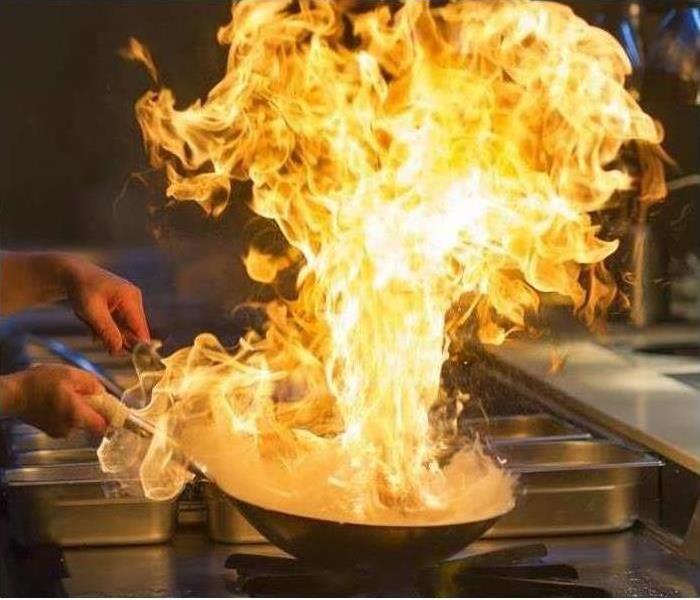 Grease fires are very common.
Grease fires are very common.
Sometimes cooking doesn’t go as planned, you keep the bread in the oven too long or worse, you could start a grease fire in your kitchen. Consider keeping a small fire extinguisher in your kitchen for emergencies, but if you haven’t purchased one yet, here are some tips for things you can do if you start a grease fire in your kitchen’s home:
3 Tips to Handle a Grease Fire
- First, you should turn off the source of the heat, meaning turn off the burner as quickly as possible.
- Second, cover the fire with another pot, a metal lid, or a cookie sheet. If you do not have another pot or lid nearby you can try putting baking soda or salt on top of the fire. Doing one of these things will suffocate the fire because it will not have as much oxygen reaching it.
- Finally, if you feel unsafe, go outside to a safe location and call 911 or help.
Here are some DO NOTs while attempting to put out a grease fire:
- Use water or any fabrics to put out a grease fire.
- Use baking powder. Although it may look the same baking soda, the chemical make-up is very different and it should not be substituted in the absence of baking soda.
- Moving the pot that’s on fire, this is very dangerous and should never be attempted.
We know your immediate instinct in the case of a grease fire will be to save your home. However you and your family’s safety should be your number one priority. We hope you never have to worry about a grease fire and the repairs afterwards, but if you do, call SERVPRO of Roanoke Rapids our trained professionals will be ready to help you.
What to do in the first 24 hours?
7/29/2021 (Permalink)
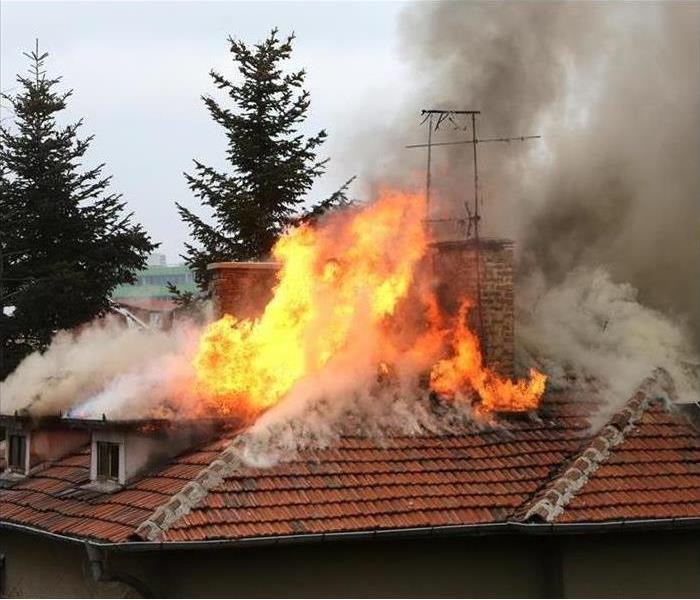 A fire in your house can cause severe damage.
A fire in your house can cause severe damage.
There is absolutely no doubt that fire in your home in Roanoke Rapids, NC, or business can be devastating. We know that even the smallest fires can destroy your favorite memories and belongings.
When we receive the call we will respond quickly and we can help you restore your home and belongings.
The first 24 hours can make a major difference in restoring your home. Below are some things we believe you should and should not do.
Things You Should and Should Not Do
THINGS TO NOT DO:
- Wash any walls or painted surfaces
- Clean or wash carpets and furniture
- Clean or whip down any electrical equipment
- Send your clothes to a dry cleaner. We do not want your clothes to be clean improperly and have a permeant smoke odor.
THINGS TO DO:
- Place aluminum foil or wood between furniture legs and wet carpet.
- Place a small layer of oil on chrome appliances or trim.
- Try your best to limit the amount of movement in the home. When you do this it will prevent soot particles from spreading even more.
- Place old and clean linens on areas that are high traffic areas in the home.
4 Ways To Extinguish Grease Fires
5/25/2021 (Permalink)
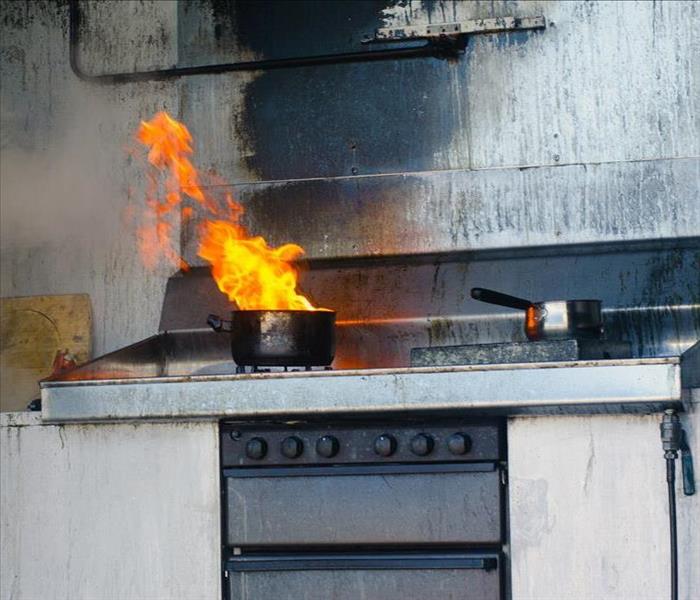 A grease fire can be devastating for your home.
A grease fire can be devastating for your home.
You may use your Roanoke Rapids, NC, kitchen every day, but fire risk probably isn't at the top of your mind. Unfortunately, it's always a risk, so it's essential to prepare in case flames develop. A grease fire can start within mere seconds of a tiny amount of grease hitting a burner on your stovetop or the inside of your oven. Just as important as knowing how to put out the flames is understanding what not to do; NEVER put water on burning grease. Instead, familiarize yourself with a few quick and safe methods of extinguishing grease fires.
Methods of Extinguishing Grease Fires
1. Smother With Salt or Baking Soda
Salt or baking soda works well for smothering flaming grease. Fire damage experts will advise you to drop either substance directly on top of the flames. Tossing it from the side of the fire can cause the fire to spread, possibly even outside of the pan.
2. Cover With a Cookie Sheet
A metal cookie sheet should be kept within reach when you're cooking, as it can cover bigger pots and pans. If you have a grease fire on the stove, slide the cookie sheet over the flames and leave it there until it has cooled.
3. Cover With a Lid
Covering a flaming pan with a pan lid can snuff out a fire. The lid should fit snugly over the top of the pan. Keep the pan as still as possible as you're doing this; movement can cause the grease to splash, only spreading the flames.
4. Use an Appropriate Fire Extinguisher
Class B fire extinguishers are designed to work for most kitchen fires. However, they don't work as well for grease fires. Class K extinguishers are designed especially for use on combustible liquids, so always keep one at arm's reach in your kitchen.
When cooking with hot oil, there's always a risk of a grease fire. Preparation is the key to significantly minimizing or even preventing damage. Either way, fire cleanup will be necessary afterward to ensure no grease remains to start another fire.
Surprisingly Simple Ways Devastating House Fires Start
2/23/2021 (Permalink)
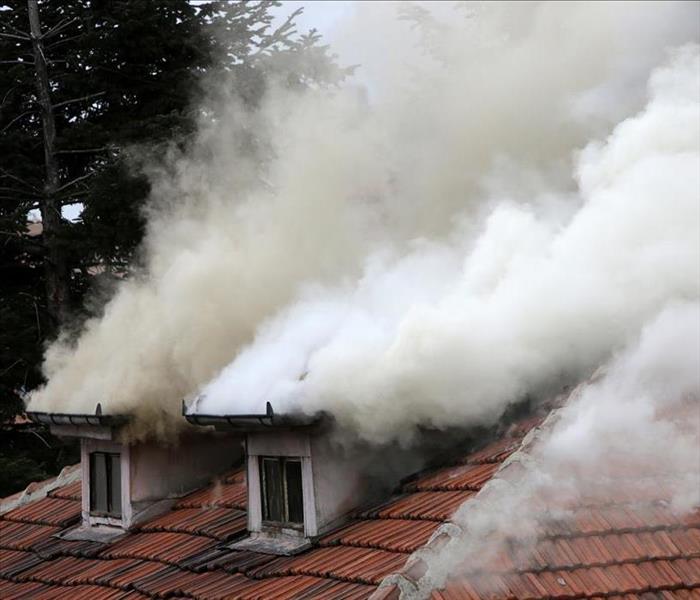 A house fire can start in surprising ways.
A house fire can start in surprising ways.
Your home is in constant danger from fire. A home fire can start in some of the most surprising ways. You should know all of the things that can cause this devastating problem and how to find a remediation company to clean up the damage.
Surprising Ways a Home Fire Can Start
Traditional Causes
There are some traditional causes that everyone worries about when they own or rent a home. These are:
- Candle fires
- Children or adults playing with fire
- Electrical fires
- Fireplace accidents
Each of these fire causes is easy to recognize, and people are taught how to avoid them. Unfortunately, some not so common fire starters exist.
Hot Work Fires
You might not have ever heard the term hot work fire. A hot work fire is a workplace or home fire that starts when someone is working with a tool or machine that uses heat or fire to do its job. This includes items like welders, soldering irons, clothes irons and other hot instruments.
Heating Fires
Heating fires are more common than others on this list, but many people don't know what exactly causes them. Heaters are supposed to be safe, but it can be said that they are as safe as anything that causes intense heat. Heating fires can start with a heater becoming too hot or when something flammable falls on a heating element.
Christmas Tree Fires
Christmas tree fires are usually caused by one of two things, electrical failure and something hot placed near a Christmas tree. This is especially prevalent when the tree is real, old and dry.
Firework Fires
These days just about everyone understands that fireworks can be dangerous to people. What they might not realize is that they are also dangerous to your home and vehicles. When a firework explodes, it can release burning pieces that fall to the ground, onto a roof or other structure. When conditions are dry, these pieces can ignite whatever they fall on causing a vehicle or home fire.
If you have a fire in Roanoke Rapids, NC, it is not the end of the world. There are fire cleaning companies that can help get you back on your feet as quickly as possible.
How To Use a Fire Extinguisher
12/29/2020 (Permalink)
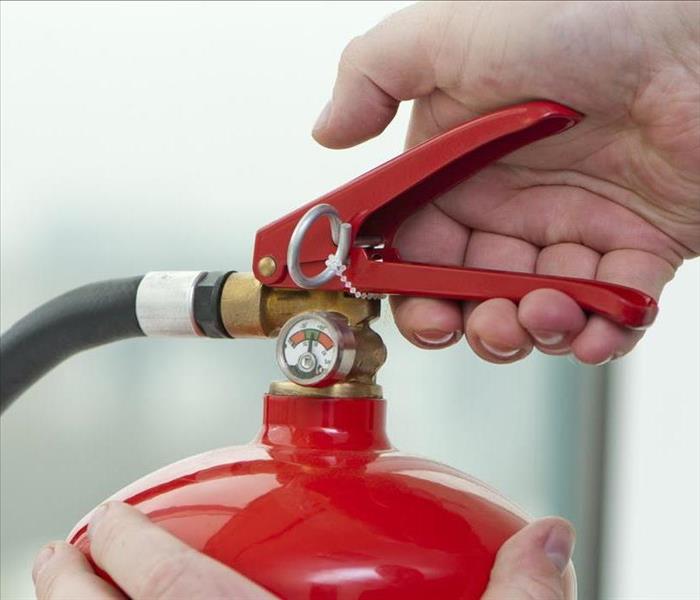 Know how to properly use a fire extinguisher
Know how to properly use a fire extinguisher
A fire extinguisher is one of the best tools to have in your home for dousing a small fire before it can spread. However, to be effective, everyone in your household needs to know how to use it.
Purchase the Right Kind of Extinguisher
When purchasing extinguishers for your home, select the right kind for the type of fires you may encounter. There are four main classes of extinguisher:
- Class A is for solid combustibles, such as paper, wood and cloth.
- Class B is for flammable liquids, such as gasoline, oil and petroleum.
- Class C is for electrical fires, such as those started by faulty wiring, appliances or fuse boxes.
- Class K is for grease fires, such as those that may occur in a kitchen fire.
Most extinguishers intended for home use are multipurpose and rated for A, B and C classes. Household extinguishers are also rated for the size fire they can extinguish, with higher numbers corresponding to larger fires.
Properly Operate Your Extinguisher
Before you attempt to use your fire extinguisher, first identify an evacuation route, so that if you are unable to douse the fire, you can quickly escape. Stand facing the fire, with your back to the exit. Remain six to eight feet from the fire. Pull the pin on the extinguisher. Aim the nozzle at the base of the fire. Compress the lever or handle to operate the extinguisher. Sweep the nozzle in a side to side motion, while continuing to point the nozzle at the bottom of the fire.
Know What To Do Next
When the flames go out, continue to observe the area for reignition. Call the fire department to inspect the fire damage. Get to a safe place. Contact a fire restoration professional in Roanoke Rapids, NC.
Knowing how to properly use a fire extinguisher can help you reduce fire hazards in your home. However, if you can not safely douse a fire, evacuate and call 911.
Grease Fire Do's & Dont's
12/15/2020 (Permalink)
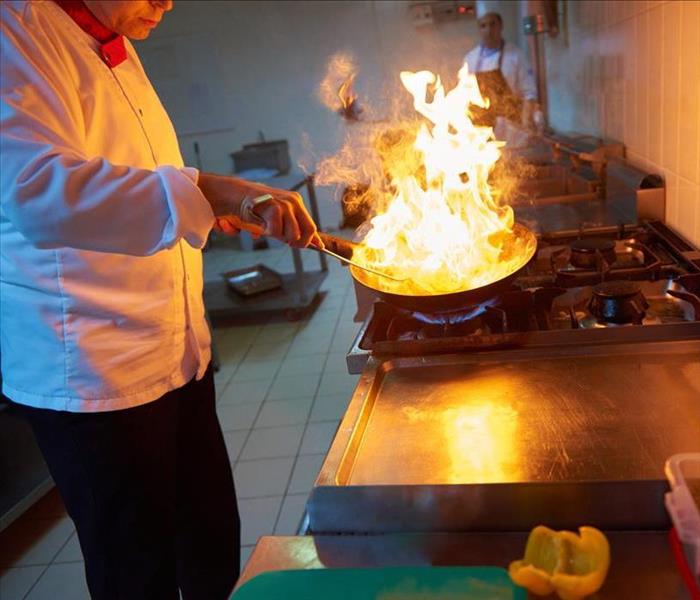 Follow these tips to avoid further fire damage in your home.
Follow these tips to avoid further fire damage in your home.
Sometimes cooking won’t go as planned and you could have accidentally started a grease fire in your kitchen.
Tips On What To Do and Not Do With a Grease Fire
Here are a few things you can do if you one starts in your home:
- Turn off the source of heat, meaning turn off the burner as soon as possible.
- Cover the fire with another pot, metal lid, or cookie sheet. If you do not have another pot or lid, try putting baking soda or salt on top. Doing this will suffocate the fire because it will not have as much oxygen reaching it.
- If you feel unsafe, go outside to a safe location and call 911 or help.
Below are a few DO NOT’s while attending to a grease fire:
- Use water or any fabrics to put out a grease fire.
- Use baking powder. Might look the same as baking soda but the chemical make up is very different.
- Moving the pot that’s on fire.
We know your home will be an instinct to save. However, you and your family’s safety are the number one priority.
Helpful Summer Fire Prevention Tips.
8/19/2020 (Permalink)
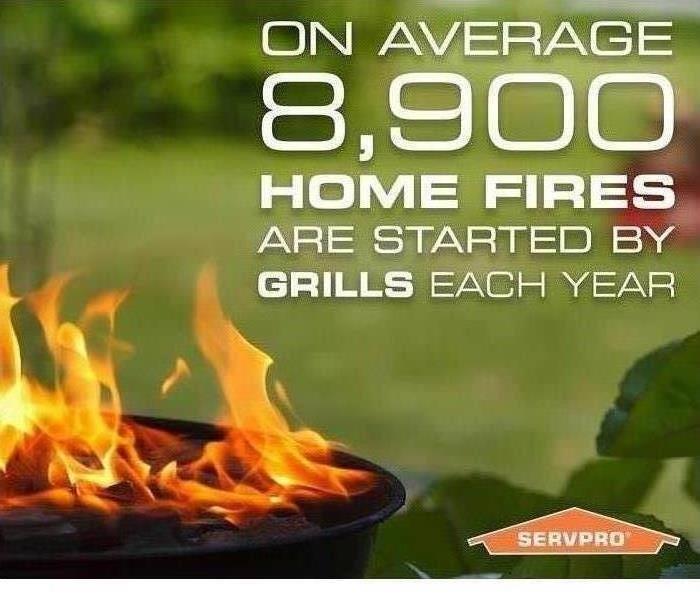 Always be sure to grill at least 10 feet away from your home and keep a fire extinguisher close by!
Always be sure to grill at least 10 feet away from your home and keep a fire extinguisher close by!
Are you planning on having a barbecue? Always make sure your grill is clean. Grease fires can start when your grill is not cleaned on a regular basis, and they can get out of control very quickly. For a grease fire, never use water, always use your fire extinguisher instead.
Fireworks are another cause of fires during the summer months. Here are a few ways to avoid an unwanted fire, NEVER light fireworks indoors, keep a hose or fire extinguisher nearby, be sure to wet the area in which you will be lighting the fireworks, and never let children handle them.
Another helpful tip is to always make sure your house number is clear and visible. So, the fire department can always find your house in a time of need.
Tips for Preventing House Fires
6/26/2020 (Permalink)
As temperatures drop and the days become shorter, possible fire hazards began to present in the home. During this time, some people break out the heated, electric blankets and space heaters to stay warm and toasty. However, it is very important to use these appliances with caution. Never plug either of these items into extension cords. The heating elements in space heaters can reach up to 600 degrees Fahrenheit and generate a lot of energy, this is why they should only be plugged directly into a wall outlet. When you use an extension cord there is an increased potential that appliance can overheat and catch fire.
According to the U.S. Consumer Product Safety Commission, it is estimated that more that 25,000 house fires are associated with the use of space heaters, resulting in about 300 deaths each year.
Here are a few safety tips to keep in mind when purchasing and installing a small space heater:
- Make sure to buy a newer model space that has up-to-date safety features. Also, be sure that the heater carries the Underwriter’s Laboratory (UL) label.
- We recommend space heaters that are controlled by a thermostat. This will help avoid wasting energy caused by overheating a room.
- Ensure that you choose a properly sized heater for the room you are trying to heat. Most heaters come with a general sizing table.
- Your space heater should be placed on a level surface away from heavy foot traffic. Keep an eye on children and pets to make sure that stay away from the heater at all times.
- Finally, as we mentioned previously, make sure to plug the space heater directly into the wall outlet.
If you do find yourself in need for fire restoration services, make SERVPRO of Roanoke Rapids your first call. Our trained professionals will work to restore your home and life, to make it “Like it never even happened.”
Steps To Take After a Workplace Fire
4/17/2020 (Permalink)
We bet you have a lot on your mind with your daily routine at work. You probably haven’t had time to think about what you’d do in case of a fire. If it were to happen it would be terrible, but would you know what steps to follow to ensure recovery and safety? Developing a fire restoration plan is important so an untimely fire wouldn’t stop your business.
What’s Your Initial Consideration?
Of course, your first response should be the safety and well-being of your employees. Then, reach out to a professional team of people who can help you put out the fire and take care of the damage in the aftermath.
Next, Contact 911
You’ve implemented your emergency plan – you got everyone out of the building. Now you need to call your insurance company and report the damage. Then you need to contact a restoration company, like SERVPRO of Roanoke Rapids, who handles fire damage and can get your office back to working condition.
Please Stay Away
As much as you’d like to be there, you should never re-enter your business during or after a fire. There’s nothing in the business that’s more important than your own life. Fire crews will try to salvage many items, and you can replace office equipment with insurance monies, but you’re not replaceable. And, touching damaged materials can cause more damage or cause yourself harm or injury.
Work With Your Insurance Company
Your business probably has professional insurance to cover fire damage. The coverage should take care of the damage, even if the fire started in a neighboring office space. Your insurance company contact should walk through the area, make notes of the damage and also note what losses the business has incurred.
Bring the Experts in the Office Quickly
A professional, experienced restoration company such as SERVPRO can ensure you can safely return to work. Their professional team will use state of the art equipment to do smoke cleaning and sanitize affected areas. Stay in touch with them so you know what the timeline to completion is.
Fire restoration is a thorough process, it take time. So, make sure you work with a reputable group of professionals. Call SERVPRO of Roanoke Rapids and let our training and knowledge handle your fire restoration needs.
What’s the Best Way to Clean Fire Damaged Fabrics?
2/9/2020 (Permalink)
Fire Damage Restoration in Roanoke Rapids Often Requires Restorers to Clean Fabrics
Any time something burns inside a building or a home, the smoke created can spread throughout the entire spaces. Smoke rises with the heat and attaches to cooler surfaces, causing extensive fire damage to your property. Gases from the burn touch surfaces throughout your home and leave behind soot and soil residue.
The smoke can travel through every room in your building or home, causing issues throughout the entire space. Many fire damage projects in and around the Roanoke Rapids area require large amounts of cleaning and soot removal during the restoration process. Since different blazes put off different types of smoke based on what burns, SERVPRO technicians use a variety of methods to clean different surfaces inside different spaces.
When we first arrive, one of our first steps is to test clean your materials and contents that were affected. Before beginning the restoration procedures, the SERVPRO of Roanoke Rapids team figures out what we can save with cleaning and which soot removal techniques will work best for each of them.
Items inside your home, like carpets and furniture, can be affected by soot and soil residues. When cleaning residues from fabrics, our trained technicians utilize a variety of methods based on the types of soot present. For example, carpet can often be restored through cleaning because heat rises. But, in some cases, carpets can collect the fallout of burnt smoke particles.
When cleaning carpets, SERVPRO technicians start by dry vacuuming the affected area. Our vacuums are equipped with high-efficiency filters that can be useful when removing light soot residues from fabrics. However, when soot residues are soaked deeper in carpets, we can clean them with detergents and deodorizers.
If any of your upholstered items, such as furniture and draperies, get damaged, we can often remove the residue with dry cleaning methods. Vacuuming or dry sponges are also able to get soils from upholstered furniture if the soot is only on the surface. In some cases, soot residues can cause furniture to stain. If this occurs, we can clean them with a one percent chlorine bleach cleaning solution to remove any stains.
If you notice soot or soil after a dire, call SERVPRO of Roanoke Rapids at 252-537-3473.
Electrical Fire Safety Tips
1/12/2020 (Permalink)
According to a recent report from the U.S. Fire Administration shows that home electrical fires claim the lives of approximately 280 Americans each year and injuries well over 1,000.
Most often, electrical fires occur during the winter months. This is due to the increased time that people are spending indoors. The increased time spent inside can affect the circuits and electrical cords. They can become overloaded by the increased use of heating devices and appliances.
If basic safety precautions are taken, quite a few electrical fires inside homes can be avoided. Please read the following for tips to take for an electrical fire:
- Replace old wiring
- Replace electrical appliances and tools if they short out, overheat, or cause small electric shocks, and most definitely if they give off smoke or sparks.
- Routinely check your electrical appliances
- Use extension cords safely and wisely; never overload electrical extension cords or wall sockets.
We hope you will never need us, but if you do the trained technicians at SERVPRO of Roanoke Rapids are here to help with all your fire restoration needs.
How To Prevent Workplace Fire
9/17/2019 (Permalink)
In 2018 there was an estimated 111,000 fires in non-residential buildings, i.e. your office space. The majority of these cases could have been prevented by being prepared and staying on top of caring for your company. Below are some of the most common causes of workplace fires, and some tips on how to prevent them.
Clutter and Combustibles
In preparation to prevent workplace fires, thoroughly clean the office building. A lack of consistent cleaning of all portions of the office and proper removal of combustibles such as cardboard, paper, or wood can cause unforeseen fires to occur.
Prevention begins with regular work-site inspections. Check all rooms, from high volume areas to areas that are normally not touched, and open ventilation to see if you have any blockages or buildup of combustible material. Cleaning electronics and equipment of dust and other particles so their vents can run properly. Speaking of electronics…
Electronics and Equipment
Misused, damaged, or faulty electronics and equipment rank the highest in causes for workplace fires. Your company can circumvent this by conducting regular maintenance tests and check-ups on all building electronics. You’ll need to be on the lookout for loose cables, damaged electronics, and overheating appliances that occurred during improper or over usage.
Arson
While not the most common, Arson still carries a large percentile of fires that occur in the workplace. You can reduce the risk of this happening to your business by installing intelligent video fire detection systems as well as up to date security systems for your workplace, like motion-sensor lighting and CCTV. Good security measures will deter potential arsonists.
Human Error
Human error will always happen where there are people. From improper use of equipment and failing to follow health and safety guidelines, to simply errors in judgment, there will be accidents on the job that lead to workplace fires. To help lower the risk probability, make sure all employees take part in regular fire safety programs and use these programs to reinforce protective policies that the company should already have set in place.
Smoking
Roughly 36% of fires (commercial and non-commercial) are caused by smokers’ materials. While banning smoking on the premises will prevent this from happening, your employees who smoke will thank you for taking a less drastic approach. Dedicate a small area outside on your property for smoking. We suggest at least 10 feet away from your building to minimize fire hazards.
Remember these tips are not a one-time deal. You must stay vigilant in keeping your business ready for any disasters that may occur. If tragedy strikes, know that SERVPRO of Roanoke Rapids is here for you. We’ll get you business up and running like it never even happened
Common Causes of Household Fires
8/30/2019 (Permalink)
 Let SERVPRO restore your home to pre-fire condition.
Let SERVPRO restore your home to pre-fire condition.
We recently talked to you about common causes of workplace fires and how to prevent them, now it’s time to turn our focus to the place that matters to you most, your home. There are many common causes for fires to occur at home, but the warning signs are visible. Take measures to avoid a fire in your home and ensure the safety of your family. Here are common causes of household fires and how to spot the danger before it happens.
Candles & other lighting
Candles smell amazing and creating fantastic mood lighting, but always blow a candle out before leaving a room. You may leave a room smelling like flowers and come back to it smelling like burnt family possession. Keep candles away from any flammable items such as books and tissue boxes.
Lampshades and light fittings can build up the heat if they are very close to light bulbs. Check around the house to make sure. Lamp bases can become a hazard if they can be knocked over easily. If this is the case with your lamp base, look into what repairs you can easily do to stabilize it. If you've installed downlights in your house make sure they're insulated from wood paneling or ceiling timbers.
Faulty wiring and electrical equipment placement
An electrical appliance, such as a toaster or vacuum, can start a fire if it is faulty or has a frayed cord. A powerpoint that is overloaded with double adapter plugs can cause a fire from overuse of electricity. A powerpoint extension cord can also be a fire hazard if not used appropriately.
Homes with inadequate wiring can cause fires from electrical hazards. Some signs to see if you’ve bad wiring are:
1) Lights dim if you use another appliance;
2) For an appliance to work, you have to disconnect another;
3) Fuses blow or trip the circuit frequently.
Have a licensed electrician come and inspect your house, or contact your landlord if you have any of the above occurrences.
When you pull out the portable heater in the wintertime, double-check to see any damages that may have happened while in storage. Clean any debris or dust off of the portable heater so they don't catch flame. Keep portable heaters at least 5’ away from anything that could easily catch fire such as furniture, curtains, laundry, and clothes. If you have a furnace, get it inspected once a year to make sure it is working to safety standards.
Cooking
Cooking was the most common causes of household fires. Pots and pans can overheat and cause a fire very easily if the person cooking gets distracted and leaves cooking unattended. Regular stove top cleaning can help keep food debris can reduce the risk of stovetop burners from smoking.
Barbeques are great for an outdoor meal, but should always be used away from the home, tablecloths or any plants and tree branches. Keep BBQs regularly maintained and cleaned with soapy water and clean any removable parts. Check the gas bottle for any leaks before you use it each time.
Smoking in bedrooms
Cooking might be the most common cause of household fires, but did you know that fires started in the bedroom or lounge cause 73% of all house fire fatalities? Bedrooms are best to be kept off-limits for smoking. A cigarette that is not put out properly can cause a flame, as the butt may stay alit for a few hours.T he cigarette bud may cause any flammable object it comes in contact with to combust into flames.
Curious Children
Kids can cause a fire out of curiosity, to see what would happen if they set fire to an object. Keep any matches or lighters out of reach of children, to avoid any curiosity turned disaster. Install a smoke alarm in your child’s room and practice a home escape plan with your children and family in case there was a fire. Inform your kids about the importance of knowing their address and if they needed to, call 911.
The above tips are a good guide to avoiding a fire in your home. If you do have a fire and need assistance with the cleanup, please call SERVPRO of Roanoke Rapids!
Safety Tips for Electrical Fires
5/14/2018 (Permalink)
A recent report from the U.S. Fire Administration shows home electrical fires claim the lives of around 280 Americans each year and can injure over 1,000.
Electrical fires occur most during the winter months due to the increased time spent indoors. With increased time inside the circuits and electrical cords can become overloaded and also increases the use of lighting, heating and appliances.
Many electrical fires can be avoided if basic safety precautions are taken. Please read the following safety tips:
- Routinely check your electrical appliance.
- Replace old wires.
- Replace electrical tools or appliance if it overheats, shorts out, causes even small electric shocks, or gives off smoke or sparks.
- Use electrical extension cords wisely; never overload extension cords or wall sockets.
Did You Know There Are Different Types Of Smoke?
2/13/2018 (Permalink)
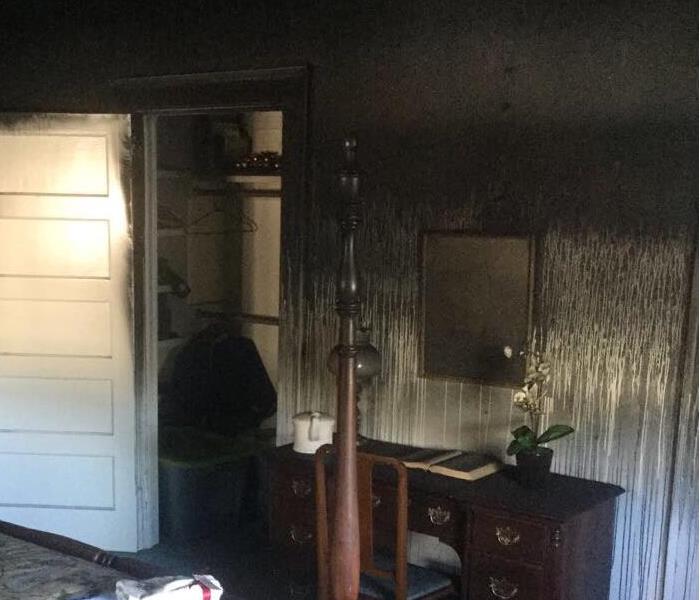 Smoke damage in a bedroom by a house fire.
Smoke damage in a bedroom by a house fire.
Once we know what caused the fire we can start to decide on what equipment and cleaning materials to use in the effective areas. The different types of smoke are below:
Wet Smoke happens when rubber and/or plastic burn. These types of fires burn at a lower temperature than other types of fires. Since the plastic/rubber burned it will leave behind an overpowering odor and will leave behind a pasty residue.
Dry Smoke occurs when papers and wood are burning. Paper and wood burn very quickly and at a high temperature. These types of fire will cause a lot of damage to the ceilings and even into attics.
Soot smoke this type is when there is a malfunction with the furnace and HVAC system. When this happens, it will put smoke throughout the home through vents. Before cleaning and repairs can happen, the furnace will need to be replaced or repaired. Then the vents in your home can be cleaned so that left over smoke does not continue to go through your home.
When you have fire and/or smoke damage in your home don’t worry about what kind of smoke is in your home, SERVPRO of Roanoke Rapids can do that for you and repair the damages.
Fire Safety
1/30/2018 (Permalink)
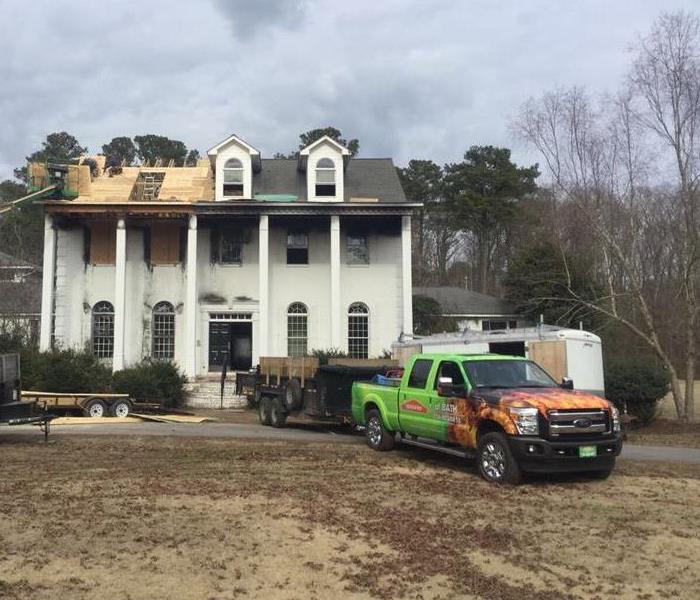 Replacing a roof truss on one of our clients homes after it had caught fire.
Replacing a roof truss on one of our clients homes after it had caught fire.
Many of us know fire 101 in our homes. We know not to leave an open flame such as, a candle or gas stove stop unattended. Even though we may feel comfortable with our knowledge of fire safety here are a few tips and reminders:
- Have a fire extinguisher on in your home. Fire extinguishers play a crucial role in protecting your home during the very early stages of fire.
- Avoid overloading your outlets or outlet extenders. They can easily over heat if they are being over used. Check on your outlets as often as you can. Make sure to replace any that may be getting worn out or old.
- When doing laundry, remember to empty link tray from dryer on every use. When the lint is not cleaned it can cause the dryer to heat to a higher temperature. Therefore, the machine will have to work harder and also work at a lower efficiently.
- Make sure space heaters are at least 2-3 feet away from furniture, window treatments, bedding, clothing, rugs, and other combustibles. These items can cause a risk of fire if they come in contact with the unit.
- Check to see if smoke alarms are working every month and replace batteries twice a year.
Heating your garage
1/17/2018 (Permalink)
With a winter that has been colder than normal, no one likes to walk out of the comfort of their warm home and into a very cold garage. A few months ago, one of our friends installed a mounted gas heater in his personal home (many other home owners and/or business owners have used space heaters as another option). The heather has made the space much more enjoyable to be in while working or just simply getting into your car. Even though heaters have many pros, there are a few cons; At times you can become anxious thinking the heater could catch fire. Here are a few tips when having a space heater in your space:
- Do not leave space heaters unattended. If you are not going to be home or going to bed turn off the heater.
- Make sure the heater is in a proper area. One that is staple and no chance of falling over.
- Be sure to check it surrounding areas, check for water or other close items that could cause a problem.




 24/7 Emergency Service
24/7 Emergency Service















